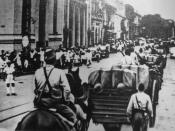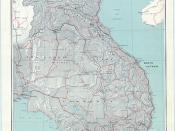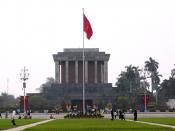Caleb Hill
Decolonization
The statement "Decolonization was a process rendered after the second world war by well organised and fiercely motivated groups conducting violent uprisings against well entrenched imperialist powers. Shared heritages bonded these people together in their desire to rid themselves of their foreign overseers. Many other forces were also at workâ¦" is accurate to some degree. However, in many cases this account is not the case.
Through the experiences of the native people in Indochina it is made clear that from the statement, "Shared heritages bonded these peopleâ¦" is immensely accurate. A whopping 90% of the Indochinese people were peasants, undoubtedly showing truth to the statement that the Indochinese had at least somewhat of shared heritage, due to the fact of their low economic status. Economic status lowered considerably after the French because of an unequal distribution of land, which the peasants were given. An excerpt of the statement "Fiercely motivated groupsâ¦" has a considerable amount of truth to it.
This is displayed through the French not "winning the people". For example, Peasants were often forced to pay ridiculously high interest prices such as 50% to 100% interest on a six-month advancement on rice. The Indochinese were also, fed up with the French taking more then they gave. Only 5% of natives were given a French education (only 500 went through secondary school and 12 through University each year), for instance. A number of well-educated Indochinese were denied jobs for being Indochinese. A number of if not all native were payed less than they deserved as a French janitor received higher wages than a native professor at Hanoi University. The natives of Indochina were also, fiercely motivated by the hatred of the French exploiting Indochinese resources such as rice. For example, large quantities of food were being exported...


